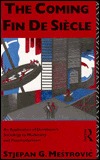

 |

|

The average rating for The coming fin de siècle based on 2 reviews is 3 stars.
Review # 1 was written on 2018-11-23 00:00:00 Jack Cherry Jack CherryAfter reading a few of his articles and even citing one in my own writings, I'd concurred with Mestrovic about the need of social sciences to engage with the 'darker', 'irrational' sides of human nature and its manifestations in society. His use of Schopenhauer had particularly appealed to me. This book is the main domain in which he puts his main theses together for a renewed sociology around a different reading of Durkheim. He connects Durkheim with the fin de siecle Zeitgeist of the end of nineteenth-century, which in turn was rightly a period of Schopenhauerian influence. Utilizing an analogy between the end of nineteenth-century and the end of twentieth-century, he advocates a new type of sociological imagination. Mestrovic tries to link Durkheim with Schopenhauer "directly", i.e. turns Durkheim into a Schopenhauerian pessimist. I have to say that he is totally unsuccessful for establishing such a claim. In fact, Harold Orbach ["The Supposed Influence of Schopenhauer on Durkheim. Anatomy of A Modern Myth that Exemplifies Merton's "Establishing the Phenomenon" Soziale Welt, 49(1),1998] powerfully demolishes such a connection. Mestrovic's Durkheim isn't the one that he wishfully imagines. Starting from a non-existing or even a contrary line of evidence, Mestrovic built hundreds of pages of theory! Mestrovic could build his assertion on around broader similarities of mental worldviews, rather than trying to assert a very direct linkage. It's totally forced. His scholarly study of Schopenhauerian metaphysics and its possible application to social & psychological issues didn't impress me [emotions shouldn't taken as simple equivalents of the Will]. Schopenhauer's "social/political theory" is more problematique than Mestrovic's simplistic -and again, wishful- account. Not just Durkheim's, but also Schopenhauer's ideas are too stretched ouside their realms in an unwarranted manner. There are lots of vague, too bold, unestablished connections. As if he lumps together all intellectuals of fin de siecle into one bag. It's not a very vigorous scholarship. In addition, the cultural references in the book (from 80s) are mostly outdated, and aren't impressive when read today. |
Review # 2 was written on 2015-11-01 00:00:00 Henry Chavez Henry ChavezIn his The Coming Fin De Siècle (1991) Mestrovic invites a reexamination of the state of society at the turn of the twenty-first century in light of the spirit of the previous fin de siècle. Durkheim, from whom Mestrovic draws most heavily, and other thinkers from the previous fin de siècle which was heavily soaked in Schopenhauer's philosophy, insisted on the importance of the irrational in the life of the individual and society by stressing on both the benign and the destructive aspects of this irrationality. By contrast, postmodernity (which, despite its supposed rebellion at all narratives - its anti-narrative narrative - is rather an extention of modernity than a genuine rebellion against it) completely overlooks the role of the irrational. The gist of Mestrovic's book is that postmodern culture is dominated by the 'mind' at the expense of the 'heart', and is still living in a post-Enlightenment, neo-Kantian world, despite the fact that the Enlightenment was already criticized in the previous fin de siècle. Thus thinkers from that period, who all emphasized the importance of the 'heart' when brought into contemporary discourse are being misinterpreted and vulgarized in order to fit with the postmodernist narrative - eg Freud is seen as a 'doctor of the mind' (as noted by Riesman) and Durkheim as a rationalist despite both thinkers' emphasis on the importance of the irrational part of human nature. Postmodernity boosters foolish optimism and a naive belief in social progress and rationality, yet cynicism, disillusionment, kitsch, decadence, crimes, and suicide, among other things, are on the rise in contemporary society. The problems that worried thinkers from the previous fin de siècle are much more prominent at the turn of the twenty-first century, and observations of thinkers from that period couldn't have been more relevant - Durkheim's anomic man, Simmel's blasé urbanite, Baudalaire's modern dandy, Tönnies Gessllschaft to name a few. Yet all these thinkers called for the important role of the 'heart', compassion, irrationality - and their ideas are not incorporated into contemporary postmodern abstractionism. A reexamination of those thinkers in the spirit of the previous fin de siècle and a return to the 'heart' is what we need. |
CAN'T FIND WHAT YOU'RE LOOKING FOR? CLICK HERE!!!